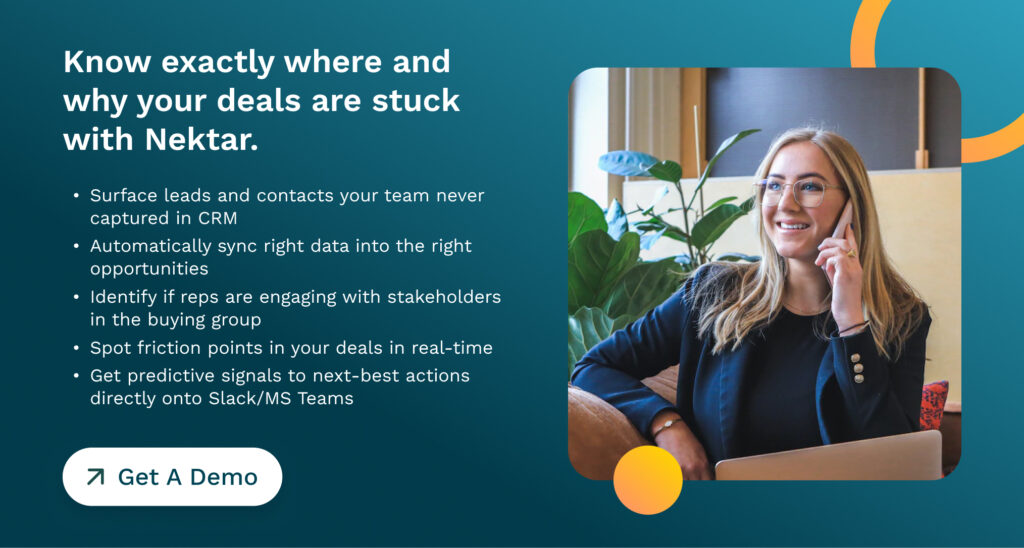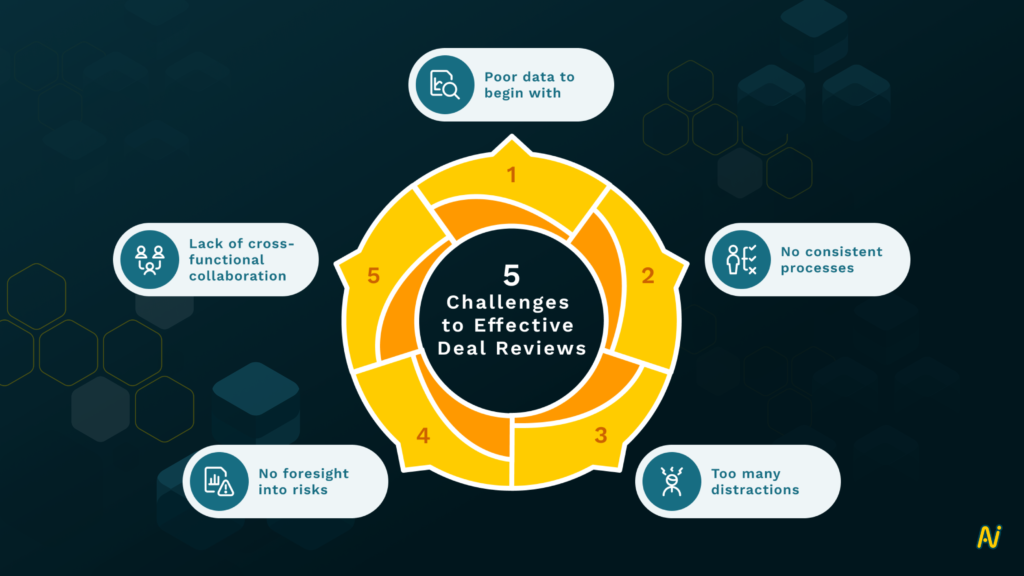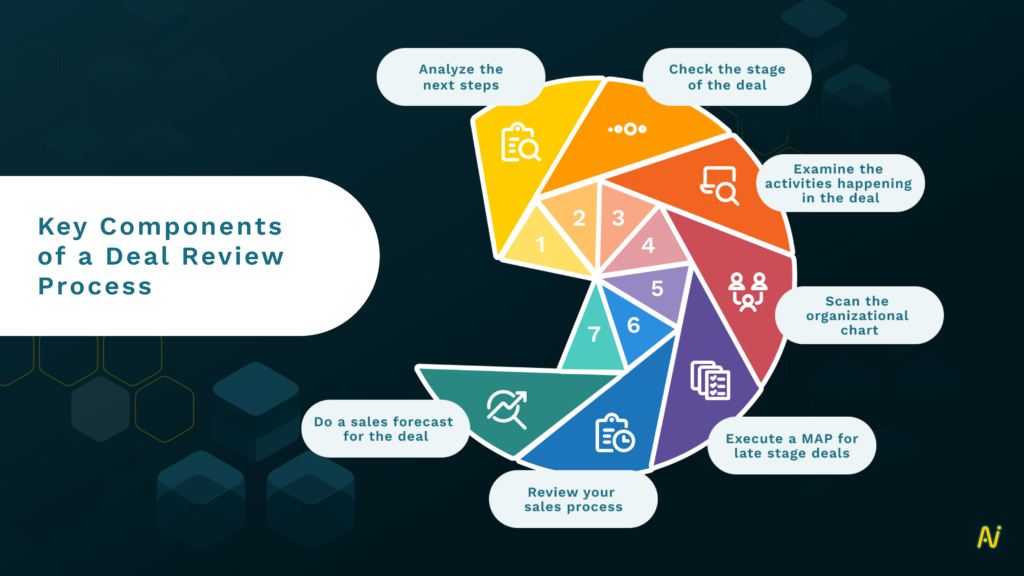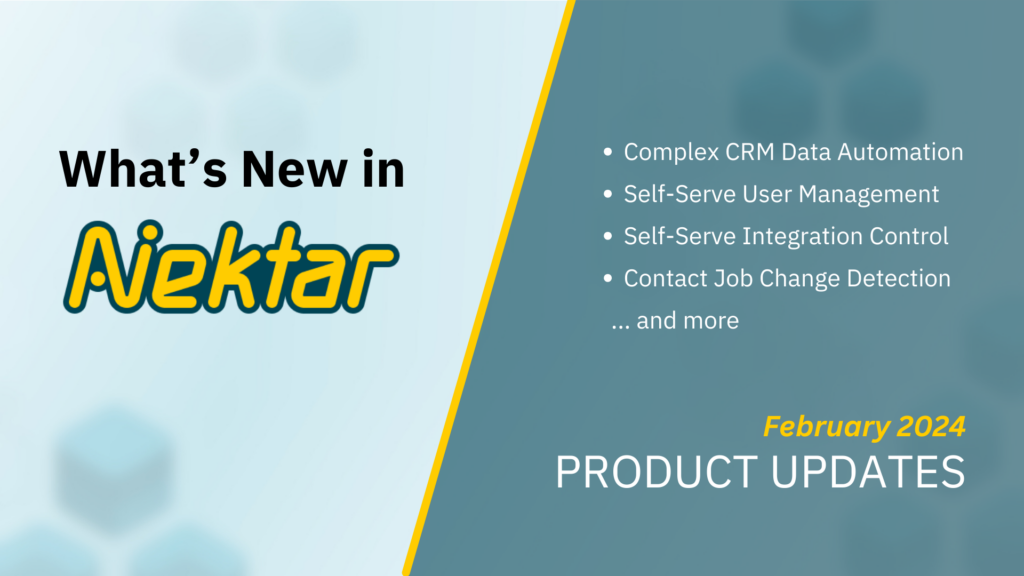Knowing the in-and-out of deals will make your revenue generation predictable. With a deal review, you can know what’s going on in your pipeline, pivot wherever necessary and get ahead of risks.
But it’s easier said than done. Most deal reviews end up being futile exercises. Instead of being organized sessions that empower your reps to sell better, they end up being unplanned, ad-hoc sessions that add little to no value to your sales team.
The result? Inaccurate revenue forecasts, missed targets, and a dip in rep morale.
With the right strategy, you can use your next deal review to unlock your revenue potential. And most importantly – help your reps win more.
This guide covers details on how you can use a deal review to your advantage.

What is a Deal Review?
A deal review is a meeting between a sales manager and a sales rep about the deals in a rep’s pipeline. Sales managers and reps review engagements with accounts. The aim is to determine the probability of closing specific deals. For deals that are stuck, next-best actions are agreed upon.
The primary purpose of a deal review is to help the sales person develop sales strategies to win a deal. It focuses on a myriad of factors for sales reps to help customers reach a confident buying decision.
If done right, deal reviews can be a game changer for sales execution. They can usher in a culture of consistent improvement across the organization. And help sales teams deliver exceptional results.
A well-structured deal review process clarifies sales issues and uncovers reasons why a prospect might not buy, as well as assists the sales team in removing roadblocks and accelerating the opportunity. Deal review sessions are sometimes viewed as inspection or even micromanagement by sales leaders by many vendors. But they are very important if the company wants to grow in the right direction.
Aseem Kishore, CEO, AKInternetconsulting.com
Why Do You Need Deal Reviews?
The pandemic-induced move to virtual selling has made selling harder than ever.
- 40% of companies failed to meet their quota in 2021.
- 93% of sales reps are experiencing significant challenges with virtual selling.
- Sales people are only spending one-third of their time talking to prospects.
It’s a crucial time for leaders to help reps navigate this complex environment and win more deals. Deal review is that tool leaders can use to address these challenges.
Here are some top advantages of deal reviews.
1. Identify risks and opportunities
Deal reviews enable sales teams to bring the most effective deals to the forefront. An effective deal review can warn your sales teams of deal risks early on. With the right information, reps can act fast and influence the outcome of the deal to their advantage.
Sales teams can focus on deals that are most likely to close. This prevents wastage of time and energy on deals that are probably not even real. Focusing on the right deals translates to better productivity and higher win rates.
2. Align with cross-functional teams
An effective deal review throws light on why some deals are stuck due to a lack of collaboration. For example, a manager might see that a rep is not going beyond the demo stage.
To help add more value to the demo, the rep can take help from a solution engineer for insights. Or the marketing team can help with some collateral. The product team can help with a better understanding of your feature differentiation.
Working together can help sell more. A deal review can enable such cross-functional collaborations. Customer-facing teams can support each other and work towards common goals.
3. Increase rep accountability
Each deal review finishes with a list of activities for the rep to do. A regular follow-up on those activities through deal reviews makes reps more accountable.
Depending on what the rep has to do next to close the deal, progress can be tracked. This regular overview makes reps more aware of their own actions. It pushes them to do their best to close the deal.
4. Gain executive support
Executive deal reviews present an opportunity for reps to seek support from leadership to help them close a top deal. This can include leveraging executive connections with a champion of an account. Or provide sponsorship to close a high priority deal.
Reps can leverage the expertise and network of their executives to strengthen the deal. Executives can also bring in a new perspective into approaching the deal.
For example, your rep might find that the champion of the deal went to the same business school as your CEO. Reps can use an executive deal review as an opportunity to leverage this connection and take advantage of it.
5. Develop sales reps
Deal reviews tell managers where reps are lacking. By knowing the areas reps need help with, managers can get straight to the point and develop reps in 1-1 sessions.
Knowing where to coach on reduces time wastage and leads to action that pushes deals forward. With more action-oriented coaching, sales reps keep getting better at selling. This has a multiplier effect on win rates and revenue generated.
For example, a deal review can inform a manager that the rep has not followed up with a prospect in over 30 days. The manager can focus on telling the rep to follow-up, and coach on the best ways to reach out to the prospect that might have gone cold.
A successful deal review should be able to validate and bring in more clarity to certain key areas. Are we solving the customer problem or helping them achieve their goals with our approach or product? Are we interacting with the right set of stakeholders? Have we understood the key concerns and objections? Are we prepared to handle them?Are we good on the pricing as well as the model? Is the implementation timeline good enough?
George Ukkuru, AVP – Quality Engineering, DevOps & SRE at Marlabs Inc.
In short, a good deal review should increase the chance of winning by helping to handle customer objections, and fine-tine the pricing, timeline, and approach.
5 Challenges to Effective Deal Reviews
Most deal reviews fail because managers spend too much time interrogating reps. They are not planned well and treated as an activity to be marked off a checklist.
Managers get a lot of information and updates on deals. But they do little to help the sales person win the deal. A lot of the advice is based on instinct. It doesn’t delve deep into the root causes of a deal not moving.
As a result, deal reviews do not bring any new insights into perspective.
Here are some of the top reasons why deal reviews fail:
1. Poor data to begin with
Data is the new currency in the modern world. Sales teams need access to the right data. They also need to be able to use that data to drive intelligence across the revenue engine.
But most organizations don’t have data-driven strategies that can help conduct effective deal reviews. Most of their data are in silos across teams such as sales, marketing and customer success.
These data inefficiencies cause brands to miss out on 70,000+ sales opportunities per year. This is a potential $36 billion in missed revenue.
Without the right data, deal reviews fail to devise strategies that help reps sell more.
2. No consistent processes
For deal reviews to be effective, they need to happen on a regular cadence. But most deal reviews are carried out with unplanned agendas. Such ad-hoc arrangements do not help deal reviews have any impact on closing deals.
The schedule for a deal review can vary from team to team. It could be a few deal reviews combined together or a weekly cadence. It could also be a large deal review where multiple stakeholders are involved.
No matter what the kind of deal review is, it needs to be an integral part of the sales process. Everyone in the sales team must be prepared for at a regular interval.
3. Too many distractions
Your organization has a lot of data. If accessed well, this data can drive powerful insights about your sales process and how to make it more effective.
For example, a manager might have to look at various data points to understand the health of a deal. It can be checking a conversation between a rep and a prospect, checking the content of an email, or tracking the rep engagement with the buying committee.
Unfortunately, most of this data is in siloed tech stacks. Checking the status of a deal might require managers to open multiple tabs to find the loopholes.
4. No foresight into risks
Traditional deal reviews rely on human tendencies like guesswork and instinct. This makes it impossible to generate realistic deal forecasts.
How do you know which deals are going to close for sure, so that you can set your numbers for the quarter?
Without visibility into pipeline health, sales teams can’t focus on the right deals. Traditional deal reviews do not inform sales teams of risks that might lie ahead. As a result, sales teams fall prey to risks and fail to predict the fate of their deals.
5. Lack of cross-functional collaboration
Sales is no longer a job for just the sales rep. It is a relay where all departments have to run together to achieve the common goal of closing more deals.
But most organizations still operate in silos. Sales, marketing and customer success operate within their own tech stacks. They create their own strategies. Their goals are not aligned for what’s best for the company.
This misalignment causes deal reviews to miss the mark and fail to work together to address revenue challenges.

Key Components of a Deal Review Process
Now that you know the criticality of deal reviews in making more sales happen, let’s look at the key components that your deal review must have.
1. Analyze the next steps
The first step of a deal review is to look at the opportunity pipeline. Your rep will fill the deal details. But it is the manager’s job to see if what’s written is in alignment with the prospect the rep has been speaking with.
On the basis of the analysis, determine what are the next steps that the rep should take to move the deal forward. Here are a few examples of next steps:
- Send a collateral to the prospect to give a better understanding of the solution
- Share a pricing list to the prospect
- Send a case study to see how the product benefited a customer in the same category as the prospect
2. Check the stage of the deal
Look at what stage of the sales process the deal is at. Is it at the discovery stage? Has a demo already happened? Has the deal moved to the proposal stage?
Each stage has its own requirements. It’s important that your reps have everything they need to move the deal to the next stage.
For example, a deal might be at a solution stage and demand a customized feature-add. This should not go unnoticed. The rep should be able to identify this need and figure out if they can handle it well.
3. Examine the activities happening in the deal
The activities your reps undertake on a daily basis can make or break a deal. Which is why it’s crucial to look into your data and see what reps are doing. Examples of such activities can be emails sent, meetings booked, calls, demos given etc.
You should also track how the buyer has responded to these activities. Has the buyer opened the email attachment that includes your proposal? Has the buyer responded to the email?
Explore the connection between sales activities and revenue generation in your deal review. For example, if a deal is cold without any activity happening within it for 30 days, it’s a risk.
Nektar gives a very intuitive and visual representation of buyer-seller activity signals in a deal. You can view all activities in one place with a visual heat map representation.

4. Scan the organizational chart
Every B2B purchase has an average of 6.8 decision makers. You need to know who your reps are talking to in your buying committee.
You must know if your rep is talking to a technical buyer, an executive sponsor, or a champion in the deal. For example, your rep might be engaging with a stakeholder, who might actually be a detractor. This detrator does not have a say in decision making and might be pushing the deal back.
This is done by mapping the organizational chart of your prospect’s company. An organizational chart will tell you who all are the stakeholders in the deal. And who the reps should be pitching to maximize chances of a deal closing.
Look at the organizational chart and ask questions like:
- What does the buying committee look like?
- Who are we talking to right now?
- Who do we know in the deal?
Once you identify who the key stakeholders are, ask:
- What is the strength of your relationship with them?
- How often are reps engaging with the key stakeholders?
These questions will help your reps multithread and give clarity around how confident you can be of your deal.
Discover the granular insights your sales team needs to win more deals!
5. Execute a mutual action plan (MAP) for late stage deals
A mutual action plan or MAP helps speed up the sales cycle. It aligns the selling team with the customer on objectives that need to be met for the deal to close.
Critical deals which are at a late stage demand a mutual action plan between the rep and the buyer. For deals where you’re doing a POC or a solution validation discussion, this should be a part of the deal review.
A mutual action plan enlists the sequence of events that should happen in order for a verdict to come out. Each of these events must be scheduled, along with a success criteria set for each action item.
6. Review your sales process
Track the progress of sales methodologies your team uses. Examples are MEDDIC, BANT, SPIN, Challenger, and others. See if your reps are doing their due diligence and completing what’s required to stay on track on the methodology.
If there is a part of the checklist that is not completed, you can guide the rep to do so.The conventional way of doing this is to look for data that gives you this information. These data sources are usually in silos, often hard to locate and easy to miss.
Using AI-based sales tools can give you a clear view of where you are in your sales process. AI can convert your data into intelligent insights that you can use to drive decisions.
For example, Nektar assigns a score to your deals on the basis of various parameters. This score brings in processes, activities, and organizational charts together. This is an aggregated health score which combines everything across the deal review.
7. Do a sales forecast for the deal
Finally, after analyzing all the details of the deal, look at the parameters to help you forecast a sale. Once you have done your best to close existing loopholes, here are a few questions you could ask in the deal review:
- Has the rep committed to the deal?
- Is the deal committed for this quarter or next?
- What is the estimated deal size?
- What is the close date?
Data-driven insights will help you forecast your revenue for your quarter. The right data will drive logical and action-oriented discussion between managers and reps.
Sales managers can understand the likelihood of the deal getting closed in the deal review. And do everything in their capacity to help the rep close the deal.

Elevate Your Deal Review Process With Nektar
An effective deal review helps your sales team prioritize their deals. It keeps them in control and helps drive more revenue predictability.
The right technology can assist your sales teams in conducting effective deal reviews. Nektar’s modern revenue solution acts at the root cause of failed deal reviews – inaccurate data.
Nektar automatically captures relevant activity data across your revenue engine. It gives powerful insights to drive data-driven decisions. These decisions can help your reps close more deals by mending the cracks in your sales process.
With Nektar’s intuitive deal intelligence solution, you can:
1. Get clear visibility into your pipeline health
2. Examine buyer and seller activity
3. Help your reps stay on track of your sales process
4. Check if reps are multithreading
5. Forecast your quarter with accurate prediction









